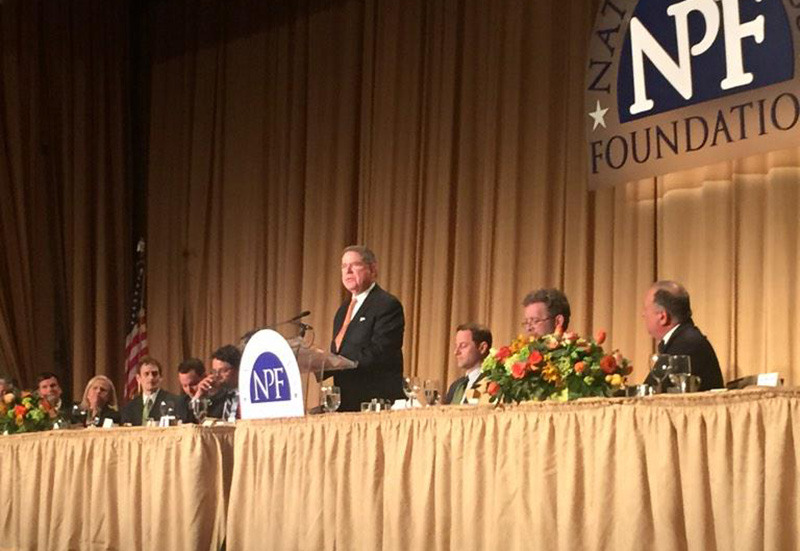
On Feb. 18, 2015, Knight Foundation President Alberto Ibargüen accepted the W.M. Kiplinger Award for Distinguished Contributions to Journalism from the National Press Foundation. The following remarks were prepared in advance of the awards dinner, where Ibargüen was introduced by Knight Kiplinger, president and editor-in-chief of The Kiplinger Washington Editors.
Thank you, Knight.
I was surprised when Sandy Johnson told me about this award, since it’s usually given to journalists, and humbled when I saw the list of past recipients – like Abe Rosenthal, who edited the paper I grew up with, and Gene Roberts, perhaps the greatest Knight Ridder editor.
The list is long and includes Seymour Hersh, whose dispatches from Vietnam deeply influenced my views of that war. The thoughtful John Siegenthaler, my friend, is on the list, as are Bob and Nancy Maynard, who gave voice to the whole community. And to be in the company of both Al Neuharth and Katharine Graham is the definition of an honor.
Of course, I’m not sure this will get me much respect at home. There’s a family story that began before our son, Diego, became First Amendment counsel at Hearst. Back then he was a reporter with the Associated Press. He was on the phone with my wife, and said he was stuck on a story. She suggested Diego call his father, who, in her mind, was in the same business.
His answer: Please, Mom. Pop is a lawyer who runs a newspaper; I’m a reporter.
I do not pretend to be a journalist. I never have. But I admit to a life-long passion for journalism and for free expression, a fascination with point of view, and a faith in the wisdom of a well-informed crowd.
I have something else in common with my distinguished predecessors, with many of you here tonight, with W. M. Kiplinger himself, and certainly with Jack Knight.
We all grew up – and became successful – in a print-oriented, principles-driven, hierarchical, steady-state media world.
We enjoyed few competitors, a highly profitable business and a public service mission to inform. Yet in the space of about 10 years, newspapers went from cash cow monopolies to cost-cutters struggling to make a profit so they could continue to serve.
So why am I optimistic?
Because we’ve never had this great an opportunity to inform and illuminate the minds of our audience.
Not since the dawn of the printing press has change been so radical, the possibilities so exciting.
Chaos for some is opportunity for others — to inform, reach, rouse the people so they can determine their own interests.
This should be a Howard Beale moment from the movie “Network.” We should all be saying, “I’m mad as hell and I’m not going to take it anymore.”
In his rant, Beale says he doesn’t know the solution but he knows he’s not going to sit around and mope. He’s mad as hell. And so should we be.
Because the best self-governance is just not possible without an informed citizenry, and an informed citizenry is impossible without good journalism.
My view of the future of journalism starts with a simple observation:
This new, digital age of communication – all around us, in our pockets, on our wrists – is profoundly changing our economy, our communities and our lives.
It’s moving fast. We may not know where it’s going, except for this: The future is digital and probably mobile and that leads to one conclusion:
If you care about journalism, you have to care about technology.
Why? Because that’s where you’ll find your audience: reading, viewing, listening, commenting, producing and distributing news.
Journalists and news people must care about the devices people use, and will use, how they use them and how they will value information, depending on the platform or device.
We can wring our hands and pray for time to freeze, so the New Republic will never change and the Times-Picayune will return to full print, or we can look with hope and goodwill as the current leadership works to find a way that fits the times.
We have two choices: curse the darkness or light the candle.
At Knight, we choose light. We’re mad as hell and we’re doing something about it.
Values matter. Training matters. So, we maintain programs with scores of journalism schools and their deans, fellowships, Knight Chairs, new degrees, training in person and online.
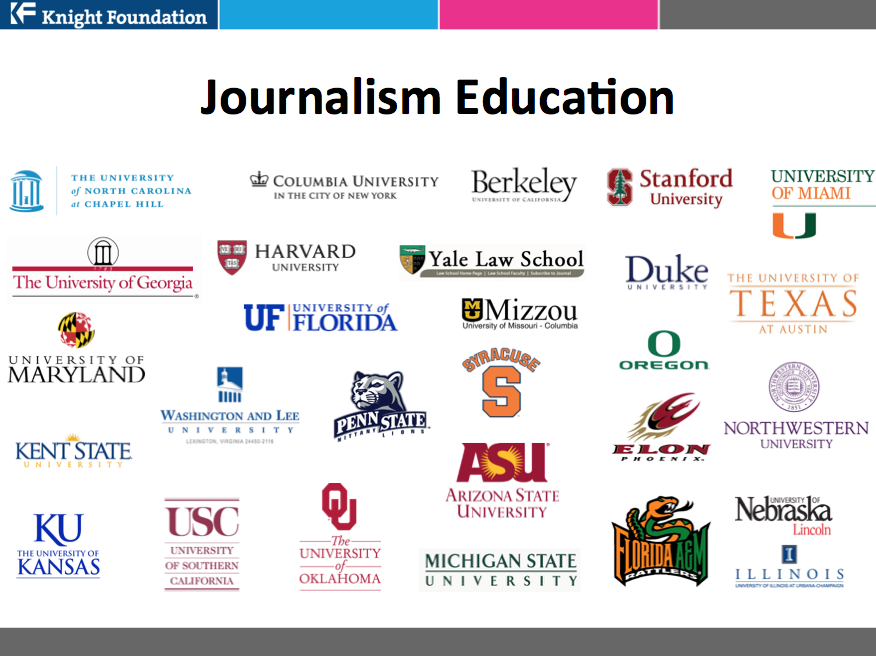
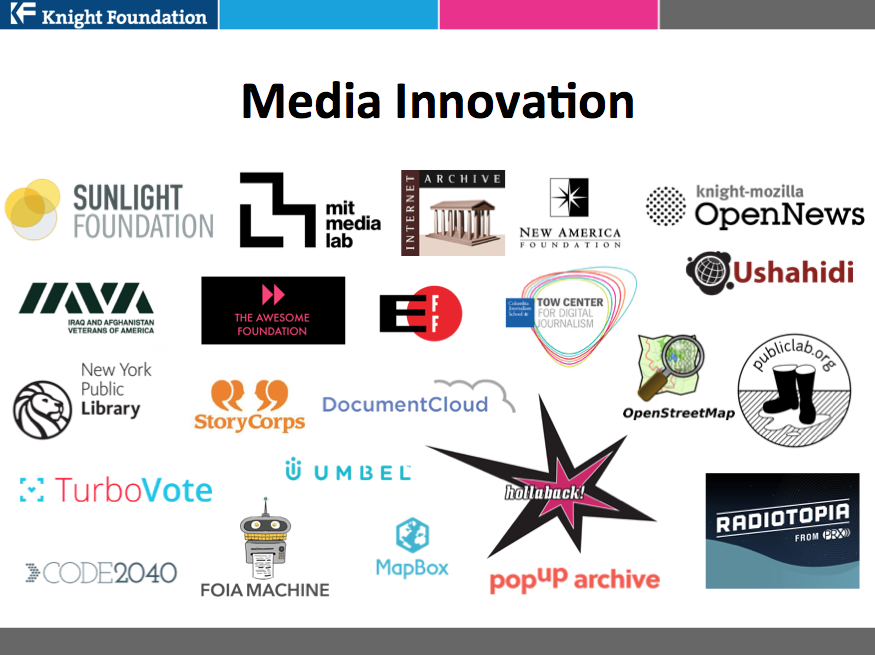
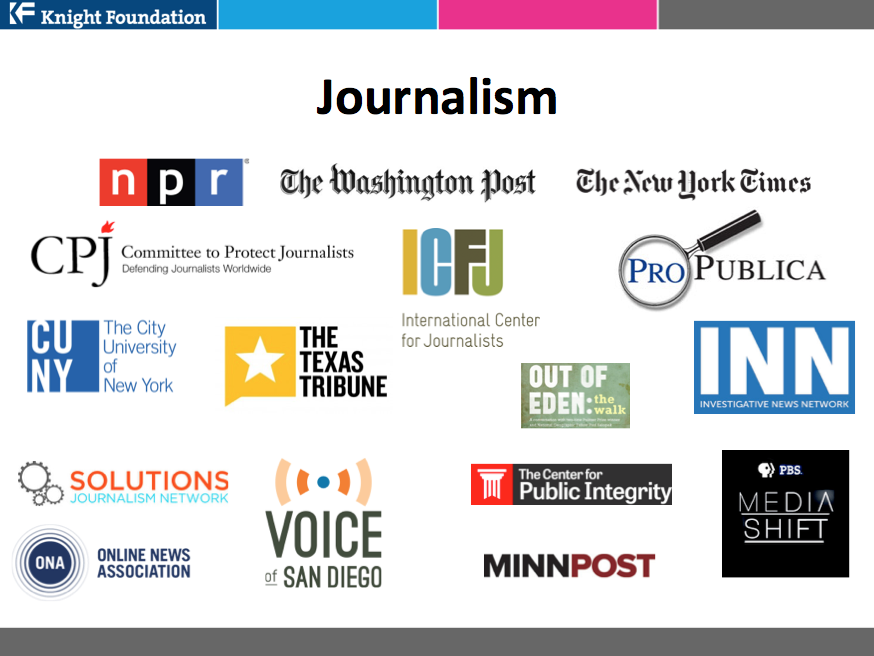
We’ve funded hundreds of media experiments, from prototypes for real-time news to open source community engagement platforms. We’ve turned to MIT’s Media Lab and the Pew Research Center, to help us understand how people use, and will use, information technology.
We do not have a “magic bullet.” Instead, we work with journalists who care about the present and the future. We’ve funded news organizations whose mission, day in and day out, is to do outstanding journalism, like Texas Tribune and the Voice of San Diego. In the short term, we’ve given some breathing space to 27 online news sites around the country by funding 15 percent of their annual budgets.
We’ve financed tech incubators at The Philadelphia Inquirer and The Boston Globe … tools such as Document Cloud by staffers from ProPublica and The New York Times … and now a new, open source community platform with The Washington Post, The New York Times and Mozilla.
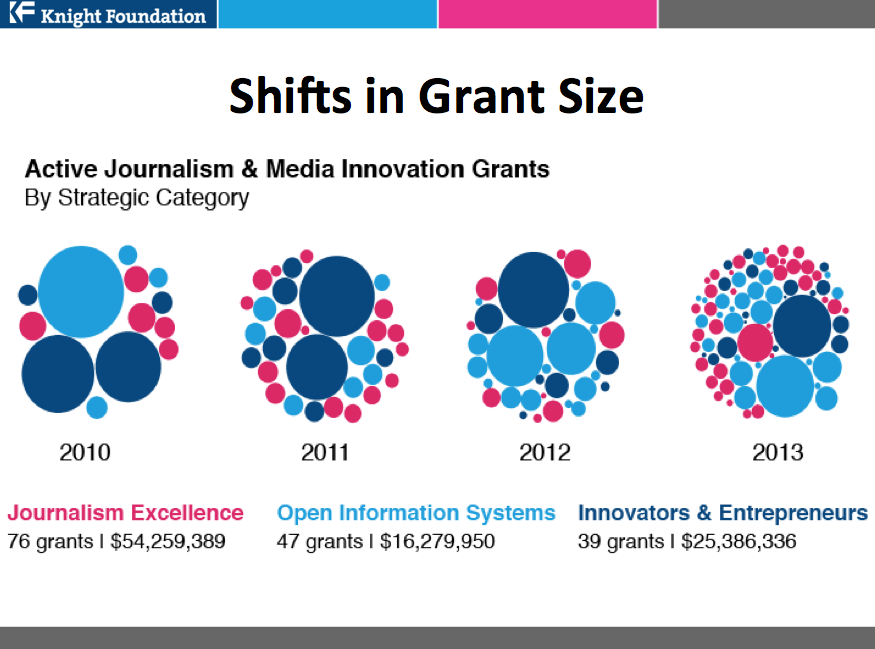
We’re still experimenting. This slide shows how we’ve moved to more and smaller projects. The chart represents more than $90 million in active grants during this four-year period.
That’s a drop in the bucket compared to what Google or Facebook might spend on development. And, sure, I wish news companies had spent their buckets on R&D when we made 20 percent or 30 percent profit.
But that was then, this is now – and we should be mad as hell and figuring out what to do next.
At Knight we just split our journalism and media innovation efforts, to better concentrate on each. Jennifer Preston, formerly of The New York Times, and Shazna Nessa, formerly of the Associated Press, and who is here tonight, are leading our journalism program, along with Eric Newton, the former managing editor of the Oakland Tribune. I am proud to say that Marty Baron, who is also here and is the executive editor of The Washington Post, chairs our journalism advisory committee.
So what does this foundation news have to do with you?
Well, I think you should be having a Howard Beale moment, too.
You should be mad and hell-bent to figure this out. Both technology and journalism matter. If you don’t experiment, you can wave goodbye to your future. If you are experimenting, please, do more. Push your boundaries.
And tell us what you learn at knightfoundation.org.
Just know that there’s no road map.
What we need is an open mind, the will to change and to meet the audience, and a compass trained on what is still journalism’s true north: the fair, accurate, contextual search for truth.
Thank you.
